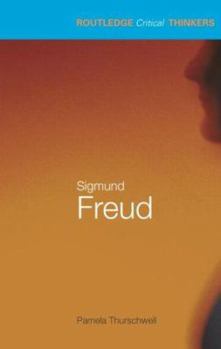Book Overview
The work of Sigmund Freud has penetrated almost every area of literary theory and cultural studies, as well as contemporary culture. Pamela Thurschwell explains and contextualises psychoanalytic... This description may be from another edition of this product.
Format:Paperback
Language:English
ISBN:0415215218
ISBN13:9780415215213
Release Date:November 2000
Publisher:Routledge
Length:176 Pages
Weight:0.45 lbs.
Dimensions:0.4" x 5.1" x 7.8"
Customer Reviews
3 ratings
A solid introduction
Published by Thriftbooks.com User , 15 years ago
For years, it was hard to specifically recommend any particular introduction to Freud. This book can serve that purpose, however, whether the reader intends to go on and read Freud himself or not. A reader will come away with a grasp of basic Freudian ideas, and understand why they are still controversial and important. While much can be said for simply jumping in and reading An Interpretation of Dreams or Five Lectures on Psychoanalysis, since Freud is a fine writer and has been masterfully translated by the Stracheys, this book could be read first to make any subsequent reading of Freud a richer, more insightful experience. The explanations are clear, the coverage comprehensive given the size of the volume, the writing interesting, and the author clearly understands her subject material. The annotated bibliography is another plus, an excellent guide for further reading. The emphasis on a literary theory approach is sound, even for those who have other purposes in mind, for as the author suggests, all psychoanalysis is a form of "reading".
a good introduction to freud's ideas
Published by Thriftbooks.com User , 20 years ago
well organized/categorized and very readable. but i found all the small typos annoying.
Analysing Freud...
Published by Thriftbooks.com User , 20 years ago
Pamela Thurschwell's text on Sigmund Freud is part of a recent series put out by the Routledge Press, designed under the general editorial direction of Robert Eaglestone (Royal Holloway, University of London), to explore the most recent and exciting ideas in intellectual development during the past century or so. To this end, figures such as Martin Heidegger, Jacques Derrida, Friedrich Nietzsche, Paul Ricoeur, and other influential thinkers in critical thought are highlighted in the series, planned to include at least 21 volumes in all.Thurschwell's text, following the pattern of the others, includes background information on Freud and its significance, the key ideas and sources, and Freud's continuing impact on other thinkers. As the series preface indicates, no critical thinker arises in a vacuum, so the context, influences and broader cultural environment are all important as a part of the study, something with which Freud might agree.Why is Freud included in this series? It is hard to come up with a more controversial and influential thinker in the twentieth century than Sigmund Freud. His name has become a household word by those who know absolute nothing about him or his real work. While starting out in the then newly-developed field of psychology as a primary focus, his thought and intellectual influence has extended far beyond to almost every academic field. Particularly in the areas of philosophy, politics, theology, sociology, and science, Freud's influence will continue to be significant for a number of reasons.Thurschwell's text is well organised. In the first chapter, she recounts both a brief biographical sketch of Freud, as well as the discussion on how Freud's development of psychoanalytic ideas and processes impacted the intellectual development of the early twentieth century. It is important to know which time-period of Freud his works were produced - a career in such a new field that extended for such a length of time means that Freud's ideas not only developed rapidly, but sometimes came to contradict each other. Thurschwell sees this kind of development as a strength rather than a weakness, but it does call for increased care on the part of scholars and other interpreters, to be careful about just how much authority to lend to any particular work or idea.One of the useful features of the text is the side-bar boxes inserted at various points. For example, during the discussion on Freud's development of sexuality (obviously a major theme in Freud from the start), there are brief discussions, set apart from the primary strand of the text, on the Super-Ego, Perversion, the Castration Complex, and Ambivalence, developing further these ideas should the reader not be familiar with them, or at least not in the way with which Freud would be working with ideas derived from them. Each section on a key idea spans twenty to thirty pages, with a two-page summary concluding each, which gives a recap of the ideas (and provides a handy






